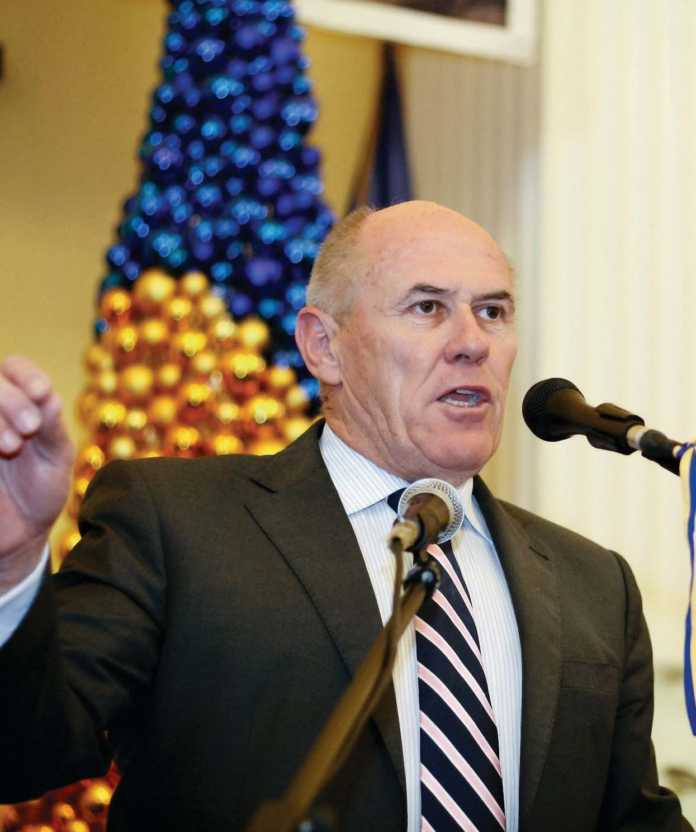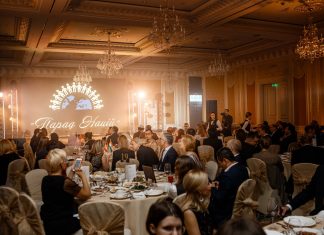— After the Maidan, the Ukrainian Diaspora has done a lot for lobbying — not to let the world forget about our war. The Diaspora is a bridge between Ukraine and the world, and today we have to understand how to make our state interesting. We have not come here to teach anyone how to live. We want to learn and help. But we have to speak about ours, because we work a lot for Ukraine. There is no such a day when we are not engaged in Ukrainian business. There are a lot of us. It is a huge job. And we are ready to work even more for victory.
Stefan Romaniv, Secretary General of the Ukrainian World Congress on August 19, 2017 Kyiv, Ukraine.
“THERE IS A WAR OF COSTS AND VALUES IN DONBAS. WHICH COUNTRY WILL BE NEXT?”
— Until 1991 Ukrainians were condemned for nothing, the question of the nation had to be fought for. Ukraine has done this, says Stefan Romanov.
Diaspora has always helped Ukraine a lot. How has this support changed over the years of the war?
— What we do most is lobbying the interests of Ukraine in the world. Our job is to find support from the states and people for Ukrainians. It was like that during the Orange Revolution and Dignity Revolution. And now in confrontation with Russia. If the world blocks SWIFT1 for Russia, then Putin will understand and the war will stop sooner. We do not encourage anyone to the World War. But imagine if Russian troops entered Ukraine? We are by a hair’s breadth of this. The Diaspora around the world calls on the international community and the governments of their countries to support Ukraine. Because it is the war of costs and values. The world has created these costs and values, but Putin does not respect or consider them. The way things are going, which country will be next?
Can Ukraine stop it independently?
— A lot depends on Ukraine. But we need support. Therefore, lobbying of Ukraine is constantly going on in Canada, in the United States, in Europe, in Australia. In the USA, the Diaspora defends the provision of weapons to Ukraine. In Canada – the issue of sanctions against Russia was defended.
But you are doing a lot for Ukrainians in Ukraine as well.
— When the patriotic advocate programme was launched in 2014 and it was discussed with Uliana Suprun, then they wanted to make real changes. That was not to start anything that day, and finish next day. But in order the programme had a specific goal — helping our soldiers in the lines. The second was to make it a systemic change in defense and in various fields. And we have already partially succeeded.
How does the world respond to upholding of interests of Ukraine?
 — The Diaspora has great power. Look at sanctions against Russia. There is a difference between countries. Australia has imposed sanctions for three years. They will be overviewed in case of any changes. And look at Europe. The sanctions are overviewed there every half year.
— The Diaspora has great power. Look at sanctions against Russia. There is a difference between countries. Australia has imposed sanctions for three years. They will be overviewed in case of any changes. And look at Europe. The sanctions are overviewed there every half year.
In the USA we are given ear to. We are heard in Canada. Our community is more than a million people there. And they know how to defend the interests of Ukraine, how to help. Similarly, in Great Britain. The issue of the Holodomor was not discussed there at all two years ago. In Portugal, the Holodomor was recognized as genocide. That is what it means when there is a common goal. We all need to learn — it is not about who is the first one, and who is the last. And what is our goal – what can each of us do for Ukraine. If we act like this, then things will get busy. But everything starts with Ukraine, from the Verkhovna Rada. No need to work for political capital. Who is our enemy? If this is a party in Ukraine — we have a problem. If we come to the point that our enemy is Putin, then this is different. Then all the forces must be thrown to overcome it.
Can the Homeland help Diaspora somehow?
— The preservation of the Ukrainian language is one of the important issues. In Australia, more than 70 percent of our people have mixed marriages. And children already do not know Ukrainian as they should know. It is important to have world educational programmes for Ukrainians abroad on the level of ministries in Ukraine. Especially in the places where there are large Ukrainian communities. These are Portugal, Spain, Greece. Either there should be optional courses at all schools in Europe at the will of parents. It is real to do. We are also interested in our culture being with us, in creative teams from Ukraine visiting our communities around the world. And also, it would be very good if it was a whole cultural programme including not only performances, but also craftswomen-embroiderers. Ukrainian embroidery is very fashionable now. Ukraine can be popularized in this way.
Many say that the country will begin to develop better and faster when all the Ukrainians return from abroad. Is it possible? What will happen then?
— And who then will defend the interests of the state in the world instead of us? We were taught at Saturday school — where the Ukrainian blood is, there is Ukraine too. Therefore, everyone has his purpose — to do something for the Motherland. We make more use of where we are now. It is a great contribution to the development of the state. Someone does it, someone does not. People are different. But it has to be done. Someone then works in Ukraine.
The Ukrainians continue to go abroad. Someone goes to Russia. How do you feel about this?
— There is a strong Ukrainian community there, but under the pressure from the Russian authorities. It is not easy for them, but we help as much as we can. The cultural centre was closed by the Russian authorities. They wanted to create an obedient structure on behalf of the Ukrainian community. They have not succeeded so far. We have to defend that community. And people go for different reasons. We cannot forbid it. Some of the representatives of the Ukrainian World Congress were forced to leave Russia with the outbreak of the war. It was dangerous for these people to stay there. And now they are in Kyiv. They are afraid of living in Moscow.
Why are the Ukrainians going to live abroad nowadays?
— They are looking for a better luck. They are not satisfied with work and salary here. Specialists are more valued in the West, so it seems to people.
How do you estimate modern Ukrainian diplomacy?
— It is changing for the better. Our ambassadors are more active in talking about Ukraine in the countries where they work. The requirements are different for them. They are the face of the country.
Tell us what do you dream of?
— Of every Ukrainian feeling free, working in favour of their state and being happy because of that. We have to rebuild the country, and not think about the war. Ukraine has the potential. We can become the state which will be asked for.














